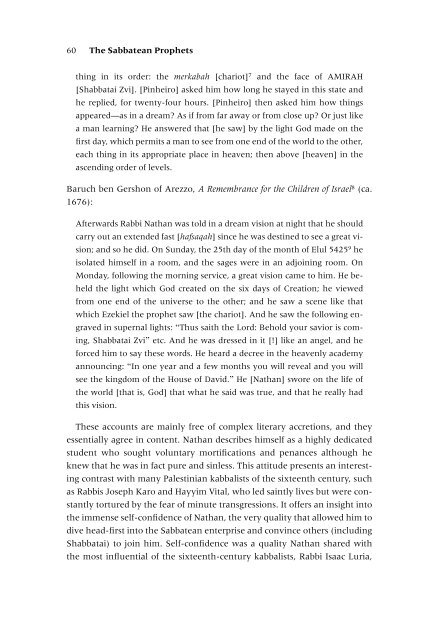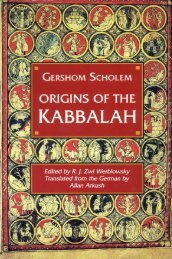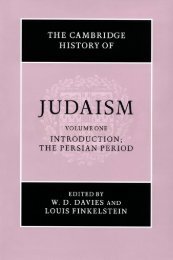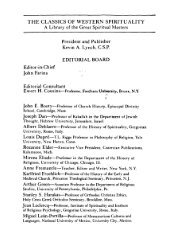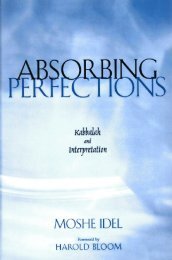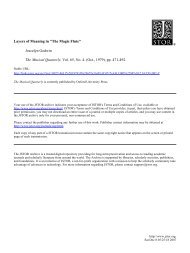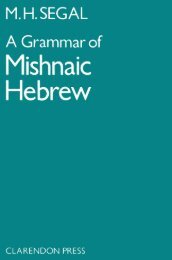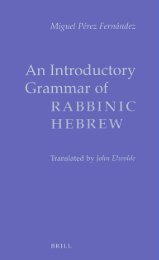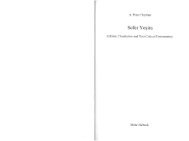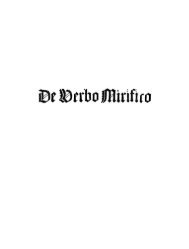You also want an ePaper? Increase the reach of your titles
YUMPU automatically turns print PDFs into web optimized ePapers that Google loves.
60 <strong>The</strong> <strong>Sabbatean</strong> <strong>Prophets</strong><br />
thing in its order: the merkabah [chariot] 7 and the face of AMIRAH<br />
[Shabbatai Zvi]. [Pinheiro] asked him how long he stayed in this state and<br />
he replied, for twenty-four hours. [Pinheiro] then asked him how things<br />
appeared—as in a dream As if from far away or from close up Or just like<br />
a man learning He answered that [he saw] by the light God made on the<br />
first day, which permits a man to see from one end of the world to the other,<br />
each thing in its appropriate place in heaven; then above [heaven] in the<br />
ascending order of levels.<br />
Baruch ben Gershon of Arezzo, A Remembrance for the Children of Israel 8 (ca.<br />
1676):<br />
Afterwards Rabbi Nathan was told in a dream vision at night that he should<br />
carry out an extended fast [hafsaqah] since he was destined to see a great vision;<br />
and so he did. On Sunday, the 25th day of the month of Elul 5425 9 he<br />
isolated himself in a room, and the sages were in an adjoining room. On<br />
Monday, following the morning service, a great vision came to him. He beheld<br />
the light which God created on the six days of Creation; he viewed<br />
from one end of the universe to the other; and he saw a scene like that<br />
which Ezekiel the prophet saw [the chariot]. And he saw the following engraved<br />
in supernal lights: “Thus saith the Lord: Behold your savior is coming,<br />
Shabbatai Zvi” etc. And he was dressed in it [!] like an angel, and he<br />
forced him to say these words. He heard a decree in the heavenly academy<br />
announcing: “In one year and a few months you will reveal and you will<br />
see the kingdom of the House of David.” He [Nathan] swore on the life of<br />
the world [that is, God] that what he said was true, and that he really had<br />
this vision.<br />
<strong>The</strong>se accounts are mainly free of complex literary accretions, and they<br />
essentially agree in content. Nathan describes himself as a highly dedicated<br />
student who sought voluntary mortifications and penances although he<br />
knew that he was in fact pure and sinless. This attitude presents an interesting<br />
contrast with many Palestinian kabbalists of the sixteenth century, such<br />
as Rabbis Joseph Karo and Hayyim Vital, who led saintly lives but were constantly<br />
tortured by the fear of minute transgressions. It offers an insight into<br />
the immense self-confidence of Nathan, the very quality that allowed him to<br />
dive head-first into the <strong>Sabbatean</strong> enterprise and convince others (including<br />
Shabbatai) to join him. Self-confidence was a quality Nathan shared with<br />
the most influential of the sixteenth-century kabbalists, Rabbi Isaac Luria,


